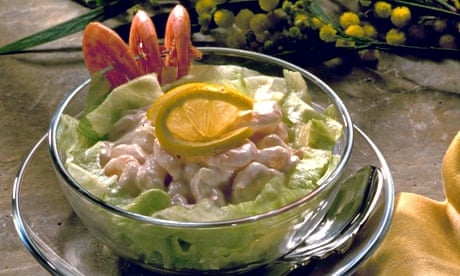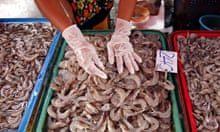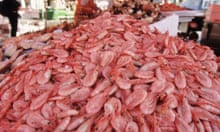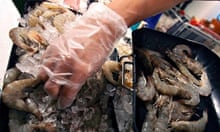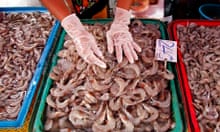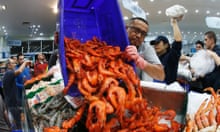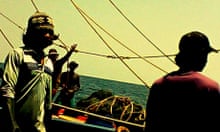Environmental campaigners and human rights groups have said the revelations of slavery in the prawn supply chain are a wake-up call for consumers. They are urging shoppers to boycott cheap Thai prawns and other imported seafood if supermarkets cannot guarantee the goods have been sourced ethically.
The Marine Stewardship Council, which backs a labelling scheme to help shoppers buy fish ethically, said the other option was to buy cold-water prawns fished from the north Atlantic – which accounts for about a third of all prawns eaten in the UK – or Dublin Bay prawns from the Irish Sea.
An MSC spokesman said: "This is undoubtedly an extremely serious and important issue. We condemn the practices described in the Guardian investigation."
The Marine Conservation Society, which advises consumers on fish to eat and fish to avoid on ethical grounds, urged consumers to try to find out, before buying, whether supermarkets were engaged with improvement projects in Thailand or the rest of south-east Asia. It said, however, that labelling was limited in its scope and might not help.
Willie Mackenzie, Greenpeace's oceans campaigner, said: "Cheap seafood trashes oceans and ruins lives. The Guardian's investigation exposing slavery in the seafood industry should be a worldwide wake-up call to retailers and consumers.
"Forced labour and human rights abuses are not just issues in tropical prawn farming, they are unseen factors in other fishing too. UK retailers are in many ways the best in the world on sourcing seafood responsibly, but there is clearly a lot more to do."
The six-month Guardian investigation established a trail between prawn products sold by US, British and European retailers and violent slave labour. The investigation found that the world's largest prawn farmer, the Thailand-based Charoen Pokphand (CP) Foods, buys fishmeal, which it feeds to its farmed prawns, from some suppliers that own, operate or buy from fishing boats manned by slaves.
Supermarkets which have sourced cheap Thai "king" prawns supplied by CP Foods include the world's top four retailers – Walmart, Carrefour, Costco and Tesco – along with big UK supermarket chains Morrisons, the Co-op, Aldi UK, and Iceland.
Retailers refrained on Wednesday from adding to their earlier statements condemning slavery and human trafficking.
A spokeswoman for the charity Compassion in World Farming said: "Consumers should take the advice of the Environmental Justice Foundation; ask retailers about their supply chain, and when buying fish look for the Marine Stewardship Council logo to ensure wild-caught fish is sustainable.
"Consumers should also be aware that there are no animal welfare standards for prawns, while there are also questions of the long-term sustainabiliy of feeding fish meal to prawns, which takes away from the global food basket, rather than adding to it."
Owen Espley, economic justice campaigner at the anti-poverty charity War on Want, said: "This investigation shows how UK retailers are profiting from appalling labour rights violations within their supply chains. British [firms] need to come clean about their sourcing and ensure action is taken to protect all workers from such abuses. The time is long overdue for British ministers to step in where retailers' voluntary initiatives have failed and ensure that all companies take action to address the exploitation throughout their supply chains."
The chef and Guardian writer Hugh Fearnley-Whittingstall, who investigated Thai prawns for his Fish Fight series for Channel 4, said that CP Foods and UK retailers had "to use their buying power and political influence to clean up Thailand's fisheries, and fast".
